What to Do οn Syros this Summer
Discover festivals, beaches, food, and hidden...
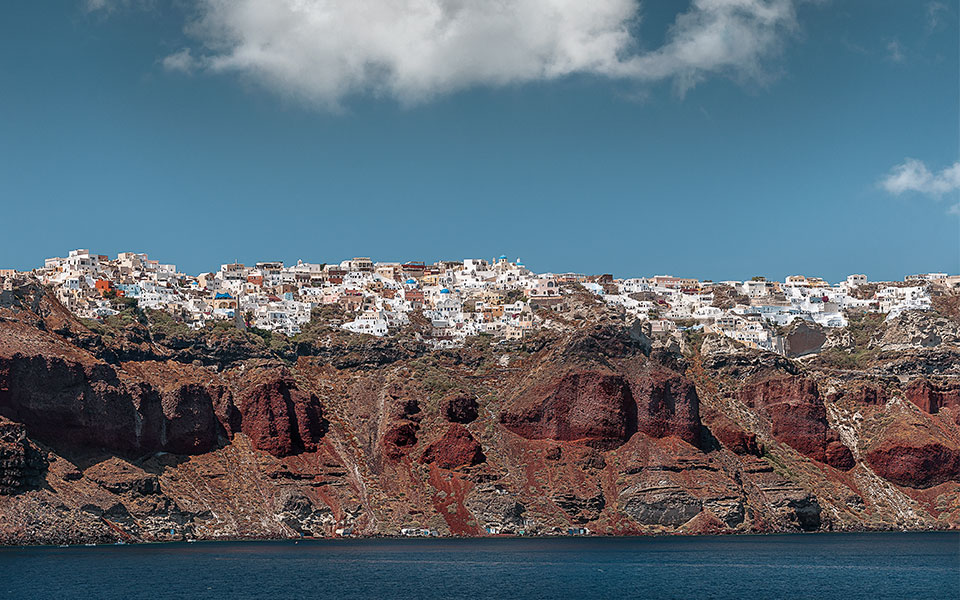
The settlements on the edge of the caldera sit high on the horizon.
© Giannis Giannelos
Having traveled to Santorini many times, by every possible means of transport and at every season, I can safely say that arriving by air really is the best way to truly understand how beautiful and special this island is. The white buildings, both hotels and homes, are like icing sugar sprinkled along the rim of the cliff; they’re in marvelous contrast to the dark volcanic soil and rocks below them. It’s amazing to think that this stunning sight is the result of a natural disaster of biblical proportions that snuffed out all life on the island around the 16th century BC. The cliff to which these sparkling hotels now cling used to be part of a volcano. Prehistoric Strongyli, as the island was known in ancient times on account of its circular (“strongylo”) shape, was partly destroyed by the eruption, and it’s what remains today that we call Santorini, Thirasia and Aspronisi.
Although so much changed over the course of Santorini’s turbulent history, there’s one constant that unites the past to the present, and this is the cultivation of grapes. Vineyards have been around in Santorini since prehistoric times. Archaeological excavation in Akrotiri has revealed that grapes were grown in the area for nearly three centuries before the devastating earthquake that led to the abandonment of the prehistoric settlement. Its resettlement some 300 years later by the Phoenicians revived the practice of viticulture. This long and illustrious tradition continues to this day.
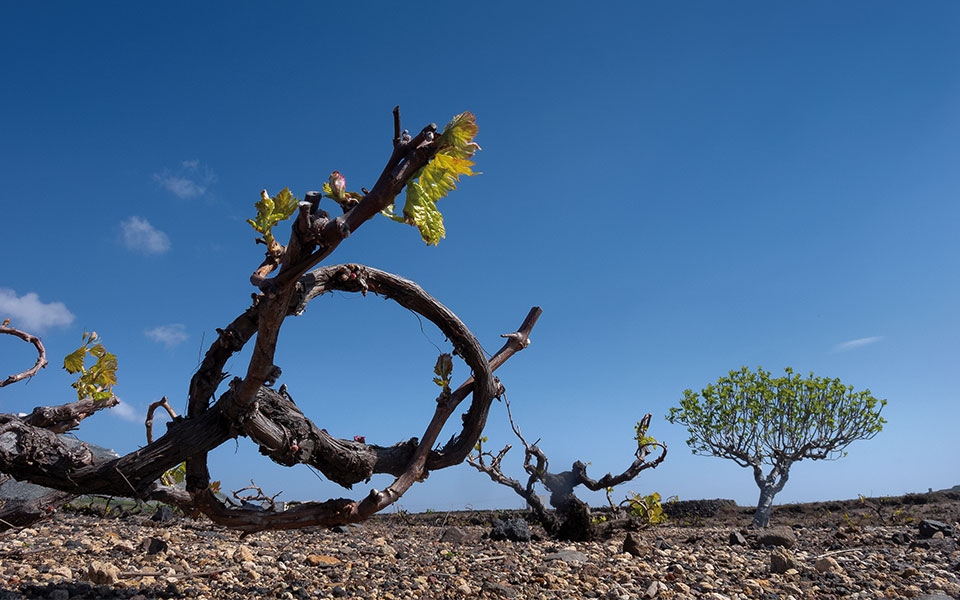
The settlements on the edge of the caldera sit high on the horizon, while the vines on the island hug the soil in defense against the winds.
© Giannis Giannelos
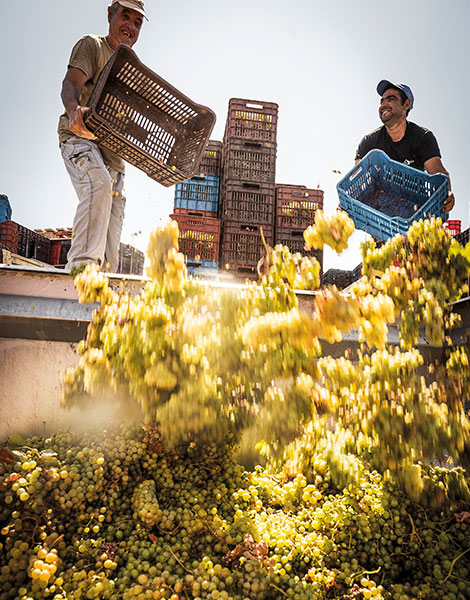
Depending on the weather, harvest usually starts in the first week of August.
© Malte Jager/Laif
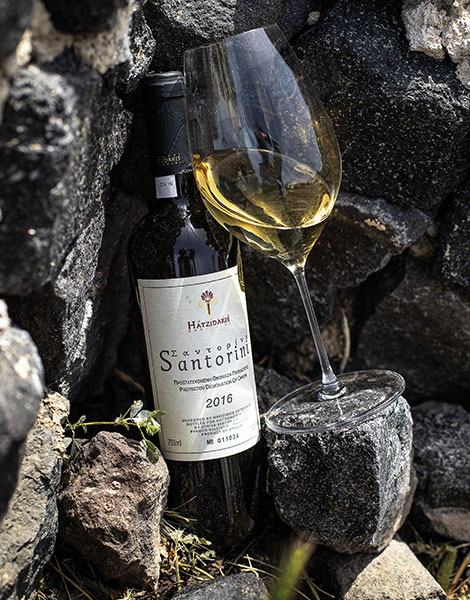
Hatzidakis’ Santorini is one of the most terroir-driven wines that the island produces.
© Christina Georgiadou
Visiting Santorini and not finding time to walk around its vineyards, or “ambelia” as they’re known in Greek, is tantamount to skipping the Acropolis when in Athens. Santorini’s vineyards are a monument of cultural heritage, and the island represents one of the oldest vine-growing regions in the world. On the drive from the airport to your hotel, you’ll pass dozens of vine plots, but if you’re not in the know, you won’t know the value of what you’re seeing.
The arid volcanic soil, the hot sun, the morning mists drifting up from the caldera, and the powerful winds that sweep across the Aegean all prompted the vine growers of Santorini to go about their business in an entirely unique way, weaving their vines into a basket-like structure, the kouloura, that lies close to the ground. The bigger the basket, the older the plant, with some of them boasting a root system more than 200 or 300 years old. The top of the kouloura is protected by the plant’s leaves; if you root around under them, you’ll find the clusters of Assyrtiko. Growing inside the basket, the grapes are shielded from the scorching sun and the scouring winds that often blow here. In the spring, Santorini’s dark landscape is blanketed in green as the grape leaves start to grow – and it is a marvelous sight.
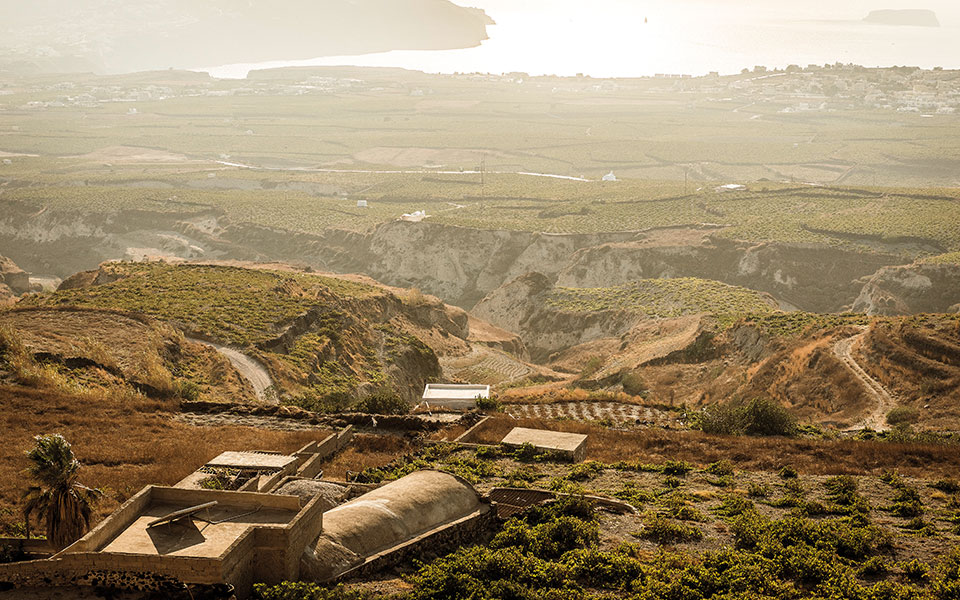
The island of Santorini, an international tourist destination that can attract up to ten thousand visitors a day, somehow still finds space for its invaluable vineyards.
© Malte Jager/Laif
The Assyrtiko variety has traveled well beyond Greece’s borders; its global reputation has resulted in plantings in other parts of the world, including Australia. However, it is Santorini’s seemingly inhospitable soil that brings out its best attributes: minerality – as though it has trapped the sea inside it – with an energy that sparks every taste bud and an incredible structure more often found in reds than whites. Both the austerely dry and acidic wines it produces and the stunning sweet wines, traditional Vinsantos, made with the sun-dried grape will remind you of the place from which they hail. Few grapes in the world manage to attest so eloquently to the character of their land of provenance.
Old-timers and traditional grape growers tend to some of the island’s greatest vineyards, which yield the elite of its grape harvest, the best of the best for the production of wine. Among the renowned vineyards are Louros and Melissotopia in Pyrgos, Kavalieros in Vourvoulos and Ai Giorgis in Megalochori.
The harvest begins in August and is a major celebration on the island, lasting some two to three weeks. The farmers start work in the early hours, cutting the grapes before the sun comes up and the heat damages the fruit. If you’re on the island in August, this is an experience that should not be missed. At some vineyards, like Gavalas (gavalaswines.gr), visitors who have expressed interest are invited to crush the grapes the old-fashioned way, underfoot, helping those wine producers to carry on this ancient custom.
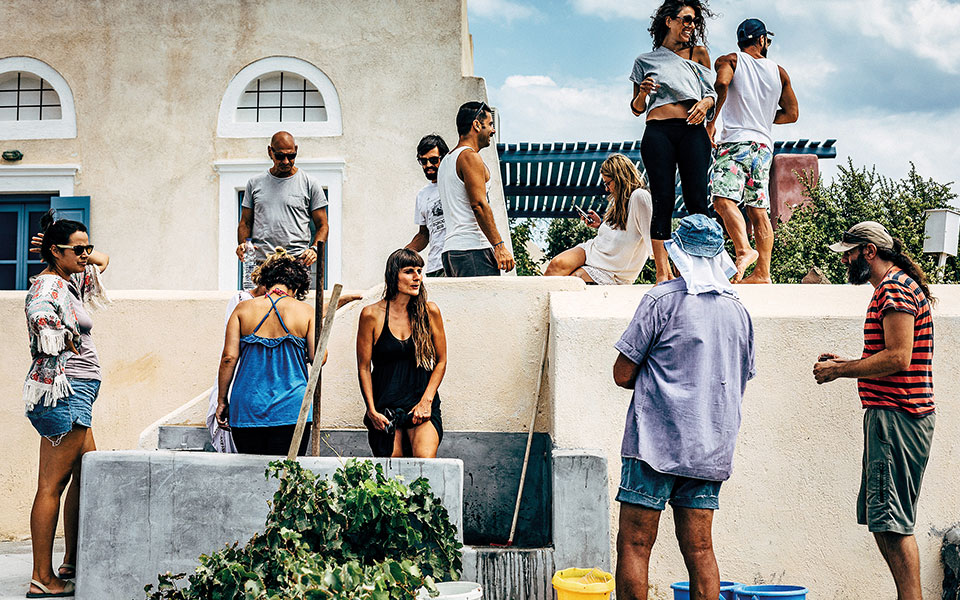
Celebrating the harvest the old way, with a round of grape-stomping.
© Vangelis Paravas
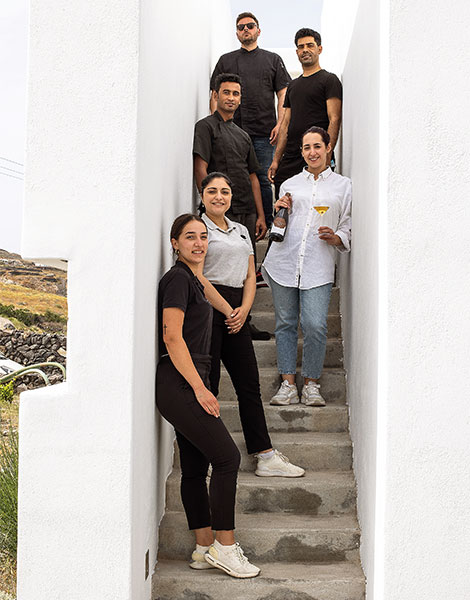
Vassaltis Vineyards
© Christina Georgiadou
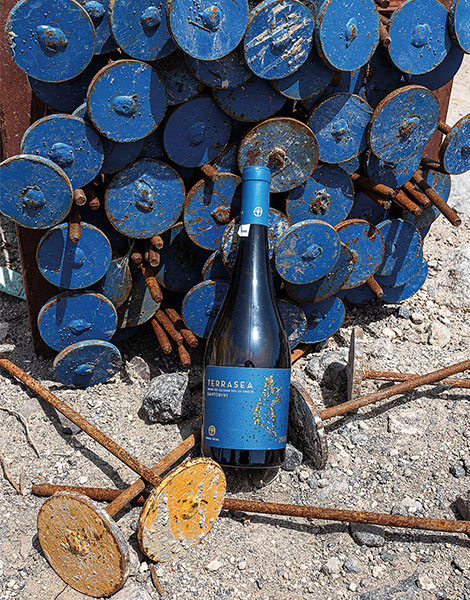
Mikra Thira
© Christina Georgiadou
Whether your tasting session takes place inside centuries-old underground wine cellars that locals call canaves or at one of the ultramodern wineries dug out of the volcanic rock, you’ll soon discover that, from a single grape, one can produce wine in almost infinite variations as you try the best vintages of Assyrtiko.
The minerality of the wines from this terroir maximizes the pleasure of enjoying it one of these grotto-like traditional canavas, where the humidity and temperature are always ideal. Some yposkafa (“dug-out”) wineries are decorated with modern works of art, others are architecturally state-of-the-art and others still are
exercises in simplicity, featuring many natural materials in their construction.
Carved into the rock, Venetsanos (venetsanoswinery.com), opened in 1949 as the island’s first industrial winery. After touring its underground passages, you’ll enjoy a tasting session on the veranda with a view of the caldera. I’d recommend trying the Nychteri, the Mandilaria and the Anagallis rosé.
Should you visit the Hatzidakis winery (hatzidakiswines.gr), you’ll be welcomed by members of the family; the canava at Volcanic Slopes Vineyards (vsvwinery.com) was totally restored some years ago and is now a modern gem. Canava Roussos presents old-fashioned (canavaroussos.gr) charm. At the multipurpose Art Space (artspace-santorini.com), tours are conducted by the owner, winemaker Antonis Argyros.
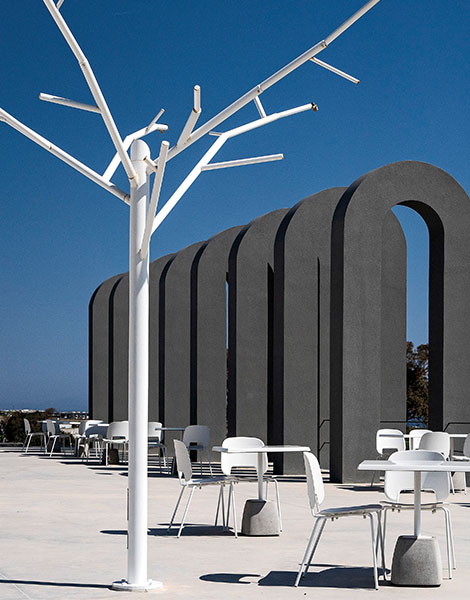
Estate Argyros
© Perikles Merakos
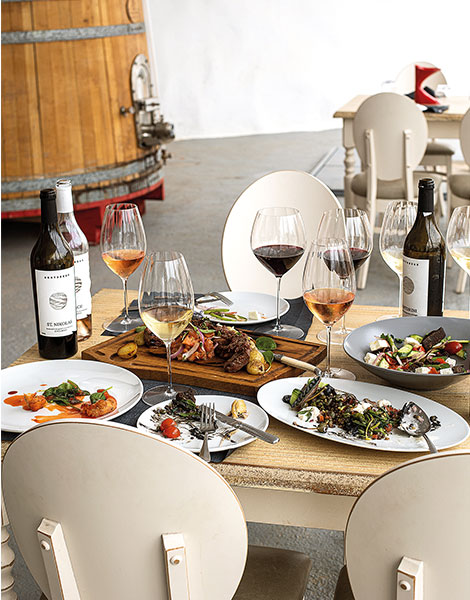
A food and wine pairing at Anhydrous Winery.
© Christina Georgiadou
A visit to Sigalas (sigalas-wine.com), Anhydrous (anhydrouswinery.com) or Vassaltis (vassaltis.com) could be expanded to include some very nice food, perfectly paired with their wines.
Tastings right on the beach are offered by the brand-new winery Oeno Pi (oenop.com) and by Gaia (gaiawines.gr). The latter is an industrial-style winery that produces the rare Thalassitis Submerged, an Assyrtiko that has undergone reductive aging in the sea. This year, thanks to the team at the new winery and vineyard Mikra Thira (facebook.com/mikrathira), you’ll have the opportunity for the first time to taste wines on the island of Thirasia, with panoramic views of Santorini’s caldera and a different angle of sight on Nea Kameni, the active volcano in the sea. For a more contemporary vineyard experience, one which brings Napa Valley to mind, stop by the architecturally ultramodern winery Argyros (estateargyros.com). -Nikoleta Makryonitou

The chefs at Domaine Sigalas.
© Christina Georgiadou
Just before the sun starts setting in the late afternoon, head up to Profitis Ilias and make sure to bring along a well-chilled bottle of Assyrtiko. The view from Santorini’s highest summit is absolutely spectacular. Sipping on the wine and looking over small plots of old, own-rooted vines trained into baskets, you’ll understand a bit more about the island’s enduring natural legacy; it’s as if these vines have been here forever.
Santorini’s food scene has something for everyone. You can sit at a taverna in Vlychada and enjoy fresh fish grilled on charcoal, accompanying it with a vibrant and energetic Assyrtiko, or treat yourself to a top-range Assyrtiko and the wonderfully sophisticated bonito with a tarama mousse and Santorini katsouni cucumber at the historic fine-dining restaurant Selene, served in the courtyard of an 18th-century Catholic monastery. It’s a gift to yourself you’ll never forget.
Don’t leave the island without a couple of bottles of Assyrtiko. Extra tip: Assyrtiko ages beautifully, acquiring a complex, nutty and mineral character. A bottle of aged Assyrtiko is the best gift you can give yourself or your loved ones as a souvenir from your Santorini visit.
Discover festivals, beaches, food, and hidden...
On its own or paired with...
Discover Greece’s winemaking heritage with tastings,...
Discover Greece’s islands in September with...